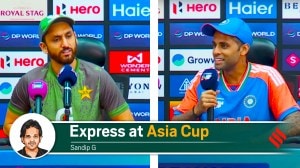Meet Hristo Iliev, professional alchemist for Indian volleyball
...

If this is indeed Indian volleyball’s golden period, the alchemist must surely be Hristo Iliev. Drafted in as national coach five months ago, the Bulgarian has had a hand in all the recent successes — and, what’s better, promises more in the future.
‘‘He has a magic wand’’, says team captain Amir Singh. ‘‘If India wants to continue this trend they should just stick to Hristo.’’
So who is Hristo Iliev? Asking him would take a long time, because the 52-year-old from Sofia prefers not to talk about himself. ‘‘I’m a coach with a degree from Bulgaria’’, he says. Probe further and he will tell you about his coaching stint in the highly competitive French League. Then, almost as an afterthought, he adds: ‘‘I also won a silver medal at the 1980 Moscow Olympics.’’
Then, modesty getting the better of him, says, ‘‘Better ask the players.’’ Ask libero Manoj Kumar and he says, ‘‘Very good but very, very exacting’’. MH Kumar, who coaches the u-21 team, puts it in a very Indian way: ‘‘Woh volleyball janta hai.’’
Ask Sreedharan, coach of the World Cup silver medal-winning under-19 team, about the great working relationship he shares with the seniors coach. ‘‘Before we left for the Youth World Cup, Hristo talked to the boys about the specific tactics to be used for each international teams. These tips came in handy.’’
|
|
|
He’s been around five months but has already made a difference. In his training, in the way he bonds with his team, in the results
|
|
|
Hristo himself can’t hid his excitement at the progress of the juniors. ‘‘My aim is to see these young boys making into the seniors squad soon. They have the potential and are just waiting to be groomed.’’
The Bulgarian is also credited with innovative techniques during the camp. Kumar recollects the ways in which Hristo made tiring, mundane eight-hour sessions interesting. ‘‘Every day there was a change in the style of training. At times he just spoke on motivation or opted for yoga,’’ he says.
What makes Hristo different from previous coaches, Kumar says, is his ability to bond with players. ‘‘In the past we have seen coaches whose involvement could be questioned. But Hristo is a friendly and jovial person who has a personal involvement with players,’’ he says.
Obviously the language barrier — the Bulgarian has to communicate with players hailing mostly from the interiors of Haryana and Andhra Pradesh — is not a problem. Amir Singh laughs. ‘‘He certainly knows English and, these days, he says things like ‘chalo, chalo’ and ‘mar do, mar do’ from the sidelines.’’
Perhaps it’s this adaptability that has helped Hristo. Early on, it’s said, he would get annoyed by the system. But, as Kumar says, ‘‘he was quick to realise the shortcomings and took the negatives in his stride.’’
One example is the weak support staff and Hristo’s way of dealing with it. The senior squad for the Asian Championship was 14 strong: 12 players, the coach and his assistant. Japan, Korea, China and Australia had a squad of about 22. Hristo didn’t have someone for the video recording, or even watch the other teams play. Did it hamper the team? ‘‘To some extent it does’’, says Amir. ‘‘But Hristo is so sharp that one glimpse and he can catch the flaws in rival teams.’’






- 01
- 02
- 03
- 04
- 05

























